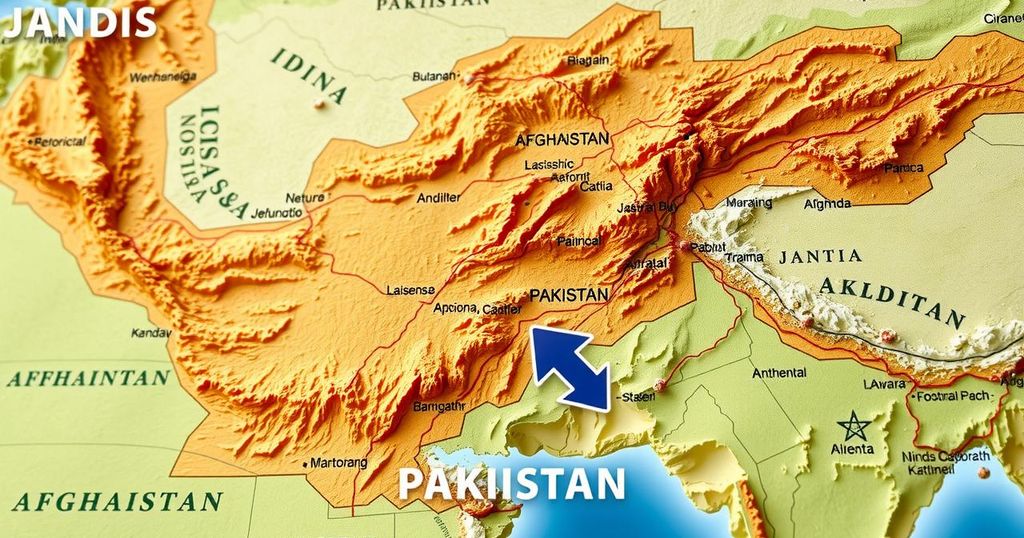Pakistan supports the Trump administration’s efforts to reclaim U.S. weapons left in Afghanistan, concerned about their use by terrorists. Trump criticizes the Biden administration’s withdrawal strategy, while relations between Pakistan and the U.S. show signs of improvement through cooperation against terrorism. Furthermore, Pakistan rejects allegations regarding Daesh and addresses tensions with Afghanistan and Kashmir, calling for adherence to international law.
ISLAMABAD: Pakistan has expressed support for the Trump administration’s initiative to recover billions of dollars worth of weaponry left in Afghanistan following the withdrawal of U.S. forces in August 2021. According to Shafqat Ali Khan, spokesperson for the Foreign Office, the concern arises from these weapons being reportedly utilized by terrorists conducting operations within Pakistan. He stated, “If the U.S. can make any efforts to get those weapons back, it would be helpful for the overall regional security environment.”
President Donald Trump has openly critiqued the Biden administration’s strategic approach to the Afghan withdrawal, asserting that leaving advanced arms in Afghanistan was a misstep. He has announced plans to pursue the recovery of U.S. weapons in Afghanistan, a move welcomed by Pakistan, given its apprehensions regarding their use by terrorist organizations. Khan noted that issues related to the Bagram Airbase were strictly between Afghanistan and the U.S.
The spokesman highlighted the possibility of thawing relations between Pakistan and the U.S., aided by recent collaborative efforts. He noted Trump’s acknowledgment of Pakistan’s role in apprehending a key member of Daesh, who was involved in a deadly Kabul Airport attack. Shafqat remarked, “Our security cooperation with the U.S. has been an ongoing process. Security, counterterrorism, and intelligence cooperation is ongoing.”
On the topic of relations with Afghanistan, Khan emphasized that Pakistan seeks amicable ties; however, the persistent issue of terrorism hampers progress. The spokesperson pointed to the Tehreek-e-Taliban Pakistan’s sanctuaries in Afghanistan as a significant concern. He remarked, “This is a constant issue which we have been raising with the Afghan authorities.” Moreover, he addressed the closure of the Torkham border, clarifying that Afghan unilateral actions led to this situation, countering media claims blaming Pakistan.
Khan explicitly condemned the Afghan government’s allegations of Pakistan harboring Daesh operatives, asserting that such claims are unfounded attempts to distract from the reality of terrorists finding refuge in Afghanistan. Additionally, he rebuffed statements from the Indian External Affairs Minister concerning Jammu and Kashmir, reiterating that self-determination for Kashmiris must be honored.
The spokesperson emphasized the illegitimacy of India’s claims over Kashmir, elucidating that the territory is internationally recognized as disputed and should be resolved in accordance with UN Security Council resolutions, including a free plebiscite. He conveyed that acknowledging ground realities is essential for lasting peace in South Asia.
In closing, Khan reaffirmed Pakistan’s commitment to combating terrorism and enhancing intelligence cooperation with the U.S. He highlighted the successful operations leading to the arrest of ISKP leader Sharifullah, demonstrating Pakistan’s resolve in its zero-tolerance approach towards terrorism.
In conclusion, Pakistan has aligned itself with the U.S. stance on retrieving weapons left in Afghanistan to enhance regional security. The ongoing security cooperation between Pakistan and the U.S. is crucial, particularly in countering terrorism linked to groups operating from Afghanistan. Both countries recognize the need to address tensions regarding Afghanistan and Kashmir, emphasizing adherence to international laws for a durable resolution. Pakistan’s steadfast commitment to combating terrorism remains evident in its cooperation with the U.S. to neutralize threats such as ISKP.
Original Source: tribune.com.pk






